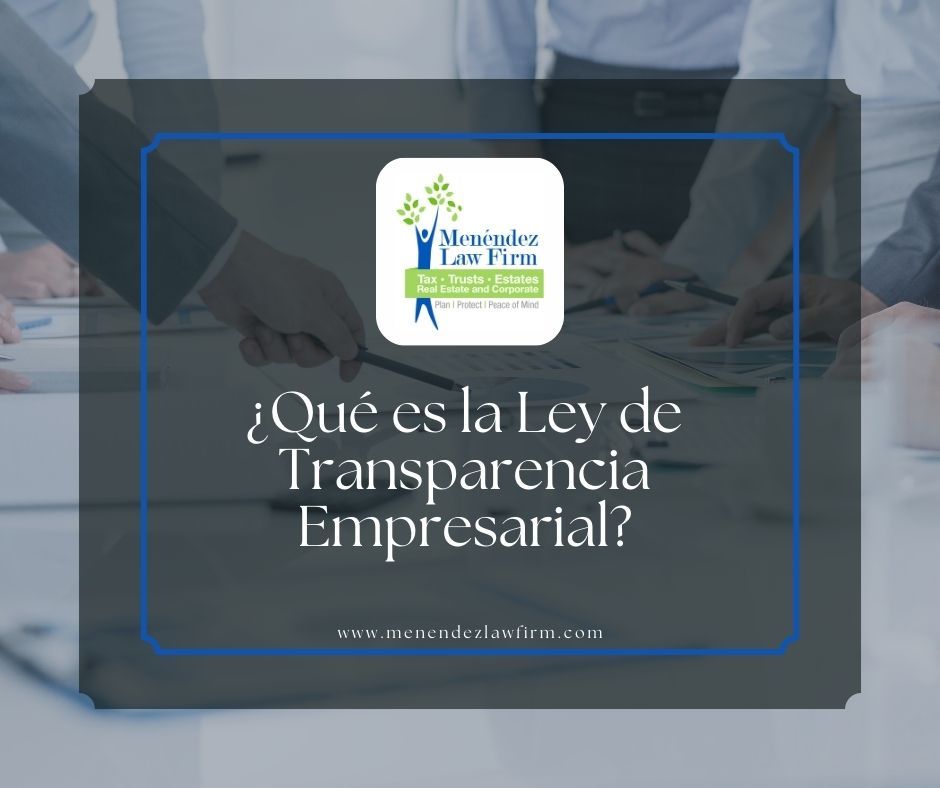2645 Executive Park Drive, Suite 427, Weston, Florida 33331
1309 Thomasville Road, Suite 215, Tallahassee Florida 32303
What is the Corporate Transparency Act?

The CTA will require certain entities (called “reporting companies”) to report information about the companies themselves, their “beneficial owners”, and company applicants (the persons who signed the incorporation and formation documents to create the entity). For purposes of the CTA, beneficial owners are not just the persons many would consider to be owners of an entity. Instead, a beneficial owner also includes any individual who, directly or indirectly, either (i) exercises “substantial control” over a reporting company or (ii) owns or controls at least 25 percent of the ownership interests of such reporting company.
There are a lot of key phrases in this definition, including “directly or indirectly,” “substantial control,” “owns or controls,” and “ownership interests.” Each of these terms is defined in the final FinCEN rule, and generally results in a very broad series of rules intended to include as many people as possible who could potentially influence the operation of the entity.
Companies that existed as of December 31, 2023, must file the initial report no later than January 1, 2025. However, entities formed on or after January 1, 2024, will be required to report no later than 30 days after the entity is formed. Because 30 days is such short time to gather all the required information, consideration should be given to forming entities otherwise planned for early 2024 no later than December 31, 2023, in order to extend the reporting deadline.
Each reporting company must file its initial report online with FinCEN. The secure filing system (the Beneficial Ownership Secure System or “BOSS”) will become available via a FinCEN online filing portal starting January 1, 2024.
The initial report must include very specific information, such as the full legal name and any trade or “doing business as name” for the reporting company, a complete street address of the reporting company, and the Taxpayer Identification Number for the reporting company. It is worth noting that a P.O. Box address or the address of the attorney who formed the entity will not be an acceptable address. In addition, the report must include detailed information for each beneficial owner and each company applicant: full legal name, date of birth, complete current residential address, a unique identifying number from certain official governmental identification documents (e.g., valid passport or government issued driver’s license), and a copy the document used must be uploaded to the portal. Lastly, the reporting company must certify that the information being reported is true, accurate and complete.
Yes! There are 23 exceptions to the reporting requirements of the CTA, but the exceptions apply mainly to large companies with more than 20 employees and gross receipts in excess of $5 million, non-profit organizations, and companies that are already subject to significant regulations. Hence, these new CTA requirements are intended to affect primarily small companies like yours.
Not really! … For reporting companies in existence prior to January 1, 2024, an initial filing is required no later than January 1, 2025. And, for companies created on or after January 1, 2024, the initial filing is due no later than 30 days after the company’s formation.
Also, any change or correction of information will require that the information reported be updated within 30 days of any change. For instance, if a reporting company is wholly owned by A and A moves, then the reporting company must file an updated report within 30 days of A’s move. If A marries (or divorces) resulting in a name change, then an updated report must be filed within 30 days of the name change. Hence, in addition to the initial report, there is also an obligation to update, correct and report any changes to the information initially reported. The reporting obligation is continuous!
The penalties for failing to report complete or updated beneficial ownership information to FinCEN or willfully providing or attempting to provide false or fraudulent beneficial ownership information are substantial. There are civil and criminal penalties for violations of up to $500 per day, fines up to $10,000, and up to 2 years imprisonment.
There are steps you can take now to minimize or delay any potential CTA filing requirements.
First, if you own interests in old entities that still are in existence but no longer serve a purpose, serious consideration should be given to unwinding those entities prior to December 31, 2023, and formally dissolving the entities. We would be happy to assist you with this and to discuss with you the pros and cons of unwinding any particular entity. For companies that are formally dissolved on or before December 31, 2023, there will be no reporting requirements for under the CTA. (NOTE: A formally dissolved company is different from an inactive company.)
Second, if you are considering creating a new entity and can reasonably do so, you should consider creating that entity prior to December 31, 2023. This step will allow you additional time to complete the necessary due diligence for CTA reporting compliance because the initial report would not be due until January 1, 2025.
In addition, you can take steps to ensure that to the extent that you may be a beneficial owner, or a person responsible for making sure a reporting company is in compliance with the CTA, you have all the information necessary for timely compliance.
We are prepared to assist you in understanding your obligations under the CTA and determining who may be a beneficial owner. We are also committed to continue tracking the updates to the CTA rules and sharing what we learn with our clients and on our website.
To find out if you have a CTA reporting obligation you can take the CTA Quiz.
We are only working on CTA compliance for clients who formally engage the firm to do so. If you would like to engage us to work with you on any CTA compliance issues, please call our office at (954) 963-7220, or send us an e-mail at cta@menendezlawfirm.com.


BROWSE OUR WEBSITE
CONTACT INFORMATION
Phone: (954) 963-7220
Email: welcome@menendezlawfirm.com
1309 Thomasville Road, Suite 215
Tallahassee Fl 32303
BUSINESS HOURS
Monday
9:00 am - 5:00 pm
Tuesday
9:00 am - 5:00 pm
Wednesday
9:00 am - 5:00 pm
Thursday
9:00 am - 5:00 pm
Friday
Closed



Content, including images, displayed on this website is protected by copyright laws. Downloading, republication, retransmission or reproduction of
content on this website is strictly prohibited. Terms of Use | Disclaimer and Privacy Policy



